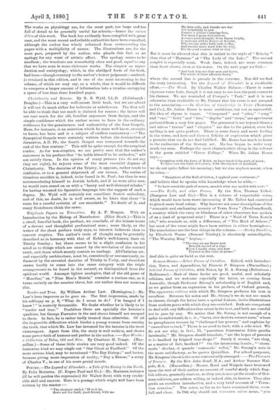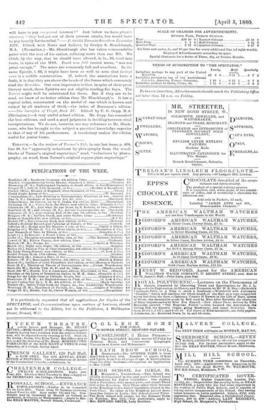POETRY.—The Legend of Allandale : a Tale of the Rising
in the North. By Felix Morterra. (C. Kegan Paul and Co.)—Mr. Morterra imitates (if he will pardon the expression) Sir Walter Scott with very credit- able skill and success. Here is a passage which might well have been written by the master :— " The stranger smiled, 'If so it be,
Rests not the fault, good friend, with me. My duty calls, and thanks are due For hospitality to you. Forgive a soldier's bearing free, or deem I mean discourtesie.
A sound good draught, from flagon bright, Is welcome still to Knave or Knight, Who twenty miles bath rode to-day,
And twenty more must take his way.
Ere his good courser stint or stay.''
But it must be allowed that this is rather in the style of " Rekeby " than that of " Marmion " or "The Lady of the Lake." The second couplet is especially weak. Weak lines, indeed, are more common than Scott shows, even at his worst. On the next page we find,—
" And bade him see that man and horse, The whole of their effective force,"
where the second line is prosaic in the extreme. Nor did we find the story interesting. Yet the Legend of Allandale is a creditable effort.—The Weed. By Charles Walter Palmer.—There is some vigorous verse here, though it is not easy to see how the poet connects his themes. We are reminded of Cowper's "Task," and it is not otherwise than creditable to Mr. Palmer that his verse is not unequal to the association.—In Sketches of Cambridge in Verse (Newman and Co.), Mr. Julian Home is more ambitions, but not so successful. His idea of rhyme is vague. " Composed " and "odes," " song " and "one," "faith "and "late," " depths " and "steps," are specimens gathered from a very few pages. The grammar is not beyond blame ; and unless " terene" and " elegaies " are duo to the printer, even his spelling is not quite perfect. There is some fancy and more feeling in the verse, and here and there a felicity of expression which gives a promise that we do not find fulfilled. Mr. Home has much to leant in the rudiments of the literary art. He has begun to write very much too soon. Perhaps the most characteristic thing in the volume is the poem entitled Girton College." When Mr. Julian Home says,—
" Grappling with the force of Habit, ye have traeled the path of mind ; Ye have seen the light of Culture, with the crystals of mankind,
we do not quite follow his meaning ; but we can anyhow assent, when he cries,—
" Daughters of the Hall of Girton, I applaud your sentiments ;" and believe that he speaks with knowledge when he adds,— " Ye have sewed the garb of women, mended what was spoiled with rents." —The Exile, and other Poems. By the Hon. Thomas Talbot. (Sampson Low and Co.)—This is a volume of respectable verse, which would have been more interesting if Mr. Talbot had contrived to give it more local colour. Why have we not some descriptions of the "romantic and enchanting scenery of Terra Nova" (Newfoundland), a country which the envy or blindness of other observers has spoken of as a land of perpetual mist ? There is a "Maid of Terra Nova's isle," who reminds us, with a difference, of "The Maid of Athens ;" but most of the verse might have been written in either hemisphere. The translations are the best things in the volume.—Dusky Rambles, by Elizabeth Warne (Samuel Tinsley), is absolutely unintelligible. "The Warning Ring" begins,— " The ring on my finger now Beareth record of a time When I madly sang, and how Trusted to the voice of grime."
And this is quite as lucid as the rest.
ScaooL-Booss.—Select Poems of Catalina. Edited, with Introduc- tion, Notes, and Appendices, by Francis P. Simpson (Macmillan) ; Selected Poems of Cat alias, with Notes, by H. A. Strong (Robertson : Melbourno).—Both of these books are good, useful, and scholarly editions, and we welcome especially the latter, as coming front Australia, though Professor Strong's scholarship is of English and, as we gather from an expression in his preface, of Oxford growth. The apparatus criticus with; which Mr. Simpson prefaces his text is excellent. Between his notes and Mr. Strong's we do not see much to choose, though the latter have a special feature, in the illustrations from modern poets with which they are enriched. Both are competent to deal with any difficulties that occur in the text, and both are careful not to iniss by any. We notice that Mr. Strong is not enough of a sailor to understand, in c. iv., " laeva sive dextera vocaret aura," where he paraphrases vocaret by "challenged her powers," and explains by "caused her to tack." There is no need to tack, with a side-wind. We do not see why, in lxvi., 15, " parentum frustrantur falsis gaudia lacrimulis," Mr. Simpson should translate, "are the hopes of parents to be baulked by feigned tear-drops ?" Surely it means, "are they, as a matter of fact, baulked ?" On the interesting lxxxiv., " chem. mode ' dicebat, si quando cornmoda' vellet," Mr. Strong's note is the more satisfactory, as he quotes Quintilian. For school purposes, Mr. Simpson 's book is the more conveniently arranged.—The Phormio of Terence. By the Rev. John Bond, M.A., and Arthur Sumner Wal- pole, B.A. (Macmillan.)—Messrs. Bond and Walpole have bestowed upon the text of their author an amount of careful study which Eng- lish editors, generally content, as they are, to accept the results of Ger- man criticism, are seldom willing, or indeed able, to bestow. They also prefix an excellent introduction, and a very brief account of " Teren- tian scansion." The notes, as far as we have examined them, seem full and clear. In 780, why should not vorsuram solves mean, "you will have to pay compound interest ?" Just below we have plagere crescunt, "they had got out of their present straits, but would have to pay heavily for the relief."—P. Ovidii Nasonis Heroidum Epistulae xili. Edited, with Notes and Indices, by Evelyn S. Shuckburgh, M.A. (Macmillan.)—Mr. Shnekburgh also has taken commendable pains with the text of his author, collating more than one MS. We think, by the way, that he should have altered, in ix., 10, tanti into tante, in spite of the MSS. Tana non fuit cannot mean, "was not great enough." The notes are commonly full and excellent. In the same Epistle, 1. 66, it might have been as well to note that incingi :zone is a middle construction. If, indeed, the annotations have a fault, it is that they are above the heads of the forms which commonly read the Heroides. Our own impression is that, in spite of their great literary merit, these Epistles are not eligible reading for boys. The Tristia might well be substituted for them. But if they are to be read, we know of no bettor edition than Mr. Shuckburgh's. It has a capital index, constructed on the model of one which is known and valued by all students of Ovid,—the index of Burrnann's edition. —The Georgics of Virgil, Book /F. Edited by C. G. Gepp, M.A. (Rivington.)—A very useful school edition. Mr. Gepp has consulted the best editions, and used a good judgment in deciding between rival interpretations. We do not, however, see any reference to Mr. Black- more, who has brought to the subject a practical knowledge superior to that of any of his predecessors. A vocabulary makes the edition useful for junior forms.



































 Previous page
Previous page